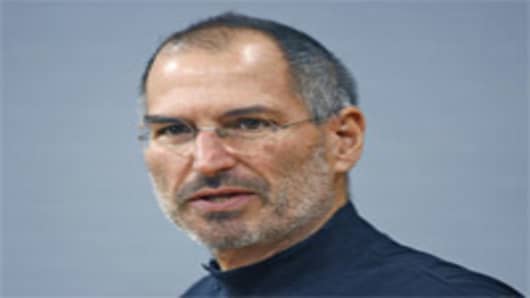When it comes to Apple and Steve Jobs' health disclosures, indeed any perceived cover-up, it all comes down to what was known, and when.
Easy questions to ask, but harder questions to answer.
With the Securities and Exchange Commission reportedly opening an inquiry into Apple amid those very questions, my colleague Bertha Coombs and I have been trying to shed some light on what grounds the SEC might, or might not, have to bring an action.
Bertha was in touch, via email, today with Harvey Pitt, the former chairman of the SEC (2001 - 2003), who now works for Kalorama Partners LLC in Washington, D.C.
She shared with me the email she received from Mr. Pitt this morning about these very issues, and his analysis of what's going on. His email, posted below, is worth a read.
"The question of Apple's disclosure is an intriguing one, and raises some serious issues," Pitt begins. He says that as a general rule, the SEC has not required companies to breach the personal privacy of senior executives. "As a result, people who have experienced heart attacks, strokes, or have alcohol problems or other medical adversity, are generally not under any obligation to disclose that, subject to certain caveats.
"The underlying assumption always is that if the senior executive has to give up his/her day-to-day duties for any appreciable period of time, appropriate and timely disclosure will be made. In addition, the rule always is that if a company or senior executive makes voluntary disclosure--as Jobs did about his health originally--that disclosure must be fair and accurate. If the normal rules apply--and I'll get to that in a moment--then Jobs and Apple might not have been under any obligation to make affirmative disclosure unless and until he was going to take a leave of absence, as he ultimately did."
This is a key point, and likely the rules under which Apple was operating. The threshold was always a simple one: either he can perform his duties as CEO or not.
Pitt continues: "Of course, once voluntary disclosure was made, Jobs and Apple had an obligation to get it right. There is at least a serious question whether Jobs did get it right. He initially downplayed the significance of his health issues, only to come back and announce that he was taking a leave of absence. Given Jobs' importance to Apple--which is atypical as far as most corporations go--his decision to take a leave of absence was surely material (and the stock market reflected that the moment it was announced). It is hard to believe that, in the short span of time between the initial announcement and Jobs' announcement of a leave of absence, his knowledge of his condition changed materially. It's not impossible, but it does seem improbable, and that's why the SEC is investigating, I suspect."
Possible, but not probable. A long-shot explanation is that Jobs was told one thing on Sunday, and then a week later, his doctors discovered something new. Again, not probable, but still an option. "Right" is a fuzzy thing when you're dealing with fast-moving, complex health issues. That may or not be the case here, but Apple and Jobs can certainly try to make that argument which may offer enough reasonable doubt to avoid any kind of action or prosecution. Another thing to consider: it's very possible that only a few people — if any — knew what the real status was, and that everyone else was sold a bill of goods. If there was a calculated effort to mislead, and I'm not saying there was, Apple's got some real problems. And that, presumably, is what the SEC will examine.
Pitt continues: "In the case of some companies, like Apple, where a CEO is so integrally intertwined with the fortunes of the Company, the general rule may not make any sense. Anything that could affect Jobs' ability to serve is something Apple would have been well advised to consider significant enough of which to make voluntary disclosure. Here, in response to the obvious physical changes in his appearance, they did make disclosure, but it seems as if they didn't get it right. If they knew or should have known it was more serious than he was allowing, they had an obligation to correct his less than accurate assessment."
"Well advised" to consider might be one thing, but legally compelled to do so is another. Further, if Jobs knew one thing, and released it, and then discovered it was something else, or the Board discovered it was something else more serious, they had an obligation to "correct his less than accurate assessment." With that follow-on release about those more "complex" health issues, some might argue that's exactly what Jobs did. Again, legal versus ethical.
Pitt didn't confirm any SEC inquiry and neither Apple nor the SEC is commenting. But Pitt's comments are useful as we all try to figure out what happened, and what happens next.
- Apple Faces Review of Jobs Health Disclosure: Report
Questions? Comments? TechCheck@cnbc.com


